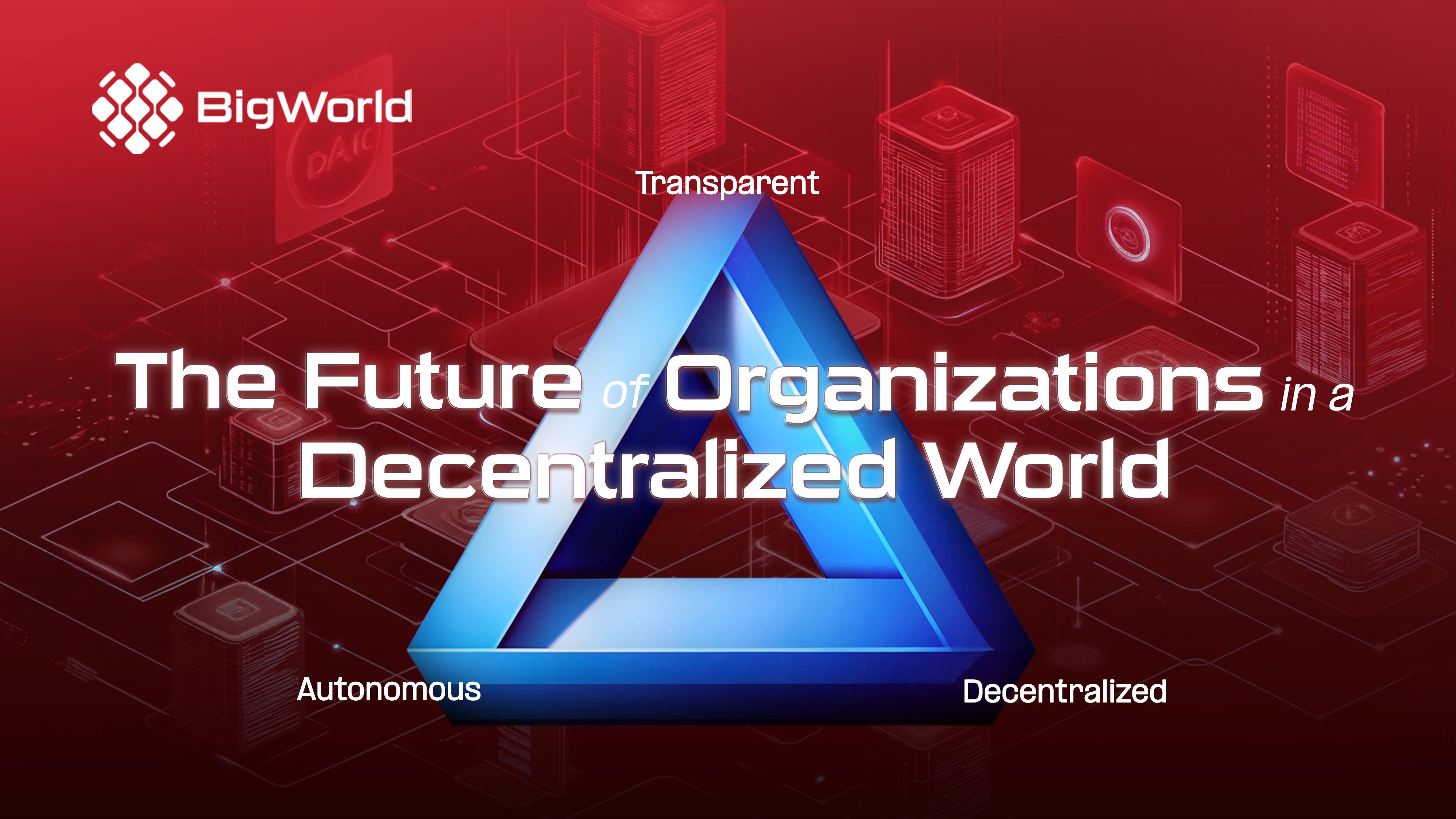The Future of Organizations in a Decentralized World

In the Web2 world, organizations rely on top-down structures—centralized, hierarchical, and often opaque. But in the age of Web3, a new model is emerging: DAOs, or Decentralized Autonomous Organizations. These aren’t just smart contracts or governance tools—they represent a radical shift in how people organize, collaborate, and make decisions. Imagine a community-run entity with no CEO, no headquarters, and no borders. At BigWorld, we explore how DAOs are redefining ownership, transparency, and collective power—potentially reshaping the future of organizations as we know them.
1. What is a DAO? How DAOs work?
1.1 What Makes a DAO Unique?
Decentralized Autonomous Organization, is a new type of organization that runs on smart contracts deployed on a blockchain. Instead of decisions being made by a centralized authority, DAOs give control to the community—anyone who holds the governance token has a say in what happens. Think of it as an organization that runs itself. Anyone can propose ideas, vote, and help shape the future - transparently and autonomously.
1.2 How Does a DAO Actually Operate?
A DAO operates through a transparent, code-driven process, without intermediaries. It starts with users holding governance tokens, which act as voting power. With these tokens, any community member can propose ideas—whether it's budget spending, launching new features, or forming partnerships. Then, the community votes on the proposal, with each vote weighted based on how many tokens the participant holds.
Once a proposal passes, a smart contract automatically executes the decision—no need for managers, signatures, or waiting on approvals. Everything happens on-chain, recorded transparently and immutably, ensuring the integrity of every action.

2. Types of DAOs
DAOs are not just theory—they’re operating today in various forms:
- Protocol DAOs manage DeFi platforms like Uniswap or Aave.
- Investment DAOs pool funds to invest in projects (e.g., The LAO, MetaCartel).
- Grant DAOs fund open-source builders (e.g., Gitcoin DAO).
- NFT / Collector DAOs co-own and curate rare digital assets (e.g., PleasrDAO, Nouns DAO).
- Service DAOs are decentralized freelancer collectives offering Web3 services (e.g., Raid Guild).
Each DAO has its own rules and governance logic, but all are powered by the same principle: community-led control.
Real-World Example: MakerDAO and the DAI Stablecoin One of the most prominent real-world examples of a functioning DAO is MakerDAO, the organization behind the decentralized stablecoin DAI. Built on Ethereum, MakerDAO allows users to lock up crypto assets (like ETH) as collateral to generate DAI— a stablecoin pegged to the US dollar without relying on central banks or traditional financial institutions. What sets MakerDAO apart is its fully decentralized governance. Holders of the MKR governance token can propose and vote on key decisions such as adjusting stability fees, upgrading the protocol, or launching new features. There is no CEO or boardroom—just a community and smart contracts working together transparently and autonomously. MakerDAO is a powerful example of how DAOs can operate in practice and play a crucial role in the DeFi ecosystem, enabling a more open, transparent, and decentralized financial future.
3. Pros and Cons of DAOs
3.1 Advantages of DAOs
- Full Transparency: All decisions are recorded publicly on the blockchain, reducing the risk of fraud and increasing trust within the community.
- Community Empowerment: Instead of relying on a central leadership team, DAOs give every token holder the right to propose and vote on key decisions.
- Cost Efficiency: Without the need for traditional management layers, DAOs significantly reduce administrative overhead and increase operational efficiency.
- Smart Contract Automation: Once a proposal is approved, smart contracts automatically execute the decision without human intervention—speeding up processes and reducing errors.
3.2 Disadvantages of DAOs
- Low Voter Participation: Many token holders do not actively vote, leading to governance inefficiencies and potential apathy in decision-making.
- Unequal Token Distribution: If voting power is concentrated among a small group, DAOs can end up replicating centralized power dynamics.
- Regulatory Uncertainty: As a relatively new concept, DAOs often lack legal recognition or clear regulations in most jurisdictions—posing compliance and legal risks.
- Lack of Agility in Emergencies: Since all changes require a vote, DAOs may struggle to respond quickly in urgent or fast-changing situations.
4. DAO – From a Tech Concept to an Organizational Revolution
DAOs are more than a tech trend — they're the embodiment of a new mindset. A world where organizations can be open, community-driven, and self-governing. We’re already seeing DAOs used to manage treasuries, support creators, launch startups, and fund climate initiatives. From MakerDAO’s financial infrastructure to Friends With Benefits’ cultural community, DAOs are pioneering alternatives to both corporate and government models.
What’s revolutionary is not just the tech — it’s the philosophy: shared ownership, collective power, and transparent action.

5. Last Words
In the near future, DAOs could serve as the foundation for educational institutions, healthcare systems, public administration, and even local governments. If you're someone who believes in innovation, community power, and the potential of blockchain, then a DAO is not just something to learn about - it's something you should actively participate in today. BigWorld believe that DAOs represent more than a technological leap — they’re the foundation of a new way to work, collaborate, and co-create. Whether you're a developer, a designer, a community builder, or just Web3-curious, there’s a place for you in the DAO ecosystem.
Join BigWorld — and become part of a global community building open, fair, and decentralized systems that empower everyone.

.jpg&w=2048&q=75)
.jpg&w=2048&q=75)